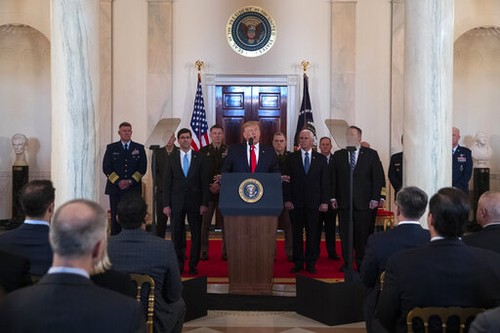|
 President Donald Trump addresses the nation from the White House on the ballistic missile strike that Iran launched against Iraqi air bases housing U.S. troops, Jan. 8, 2020. President Donald Trump addresses the nation from the White House on the ballistic missile strike that Iran launched against Iraqi air bases housing U.S. troops, Jan. 8, 2020.
(Photo: AP)
|
Analysts say neither the US nor Iran wants war. Middle East tensions rose following the killing by the US of Qassem Soleimani, the top general of the Iran Revolutionary Guard Corps (IRGC) last Friday. But since a retaliatory missile strike by Iran on US targets in Iraq on Wednesday produced no casualties, the heated confrontation has cooled down.
Iran appears to have stepped back from mounting hostilities
Shortly after targeting US forces in Iraq with missile strikes, Iranian officials said they have finished their reprisal, hinting at no further military moves, although they warned of fresh retaliatory measures if the US escalates the confrontation. Foreign Minister Javad Zarif wrote on Twitter: “Iran took & concluded proportionate measures in self-defense under Article 51 of the UN Charter,” adding that Tehran does not seek escalation or war, but will defend itself against any aggression.
Supreme leader Ayatollah Ali Khamenei called the strike a “slap in the face” of the Trump administration and demanded that US forces withdraw from the Middle East. Khamenei praised General Soleimani for being “brave, thoughtful, and cautious” in military and politics, which analysts said was aimed at “justifying” Iran’s current restraint.
Tehran has contacted the US via at least three channels, through Switzerland and other countries to deliver a message that Iran has completed its revenge and is waiting now for the US response.
US reacts with caution
After the attacks, US President Donald Trump said on Twitter, “All is well.” Later he even suggested that the US was open to negotiations with Iran. Senator Rand Paul said the president doesn’t want an endless war.
Analysts say that no American casualty in Wednesday’s attacks plus Iran’s message that its retaliation was complete led Trump to conclude that “Iran appears to be standing down.” Instead of announcing military response, Trump warned of new sanctions against Tehran.
The US House of Representatives passed a resolution on Thursday to stop President Trump from further military action against Iran unless authorized by Congress or the US faces an imminent armed attack. The resolution does not need Trump’s signature to go into effect.
Concerns and doubts
Despite the latest moves by Washington and Tehran, seen as wishing to defuse the tension, many fear a recurrence of the crisis. US Joint Chiefs Chairman General Mark Milley dismissed suggestions that Iran did not intend to kill Americans with its missiles, saying that Iranian missiles were designed to “kill personnel.” Milley said he and other military officials “fully expect” that Iran-backed Shia militia groups will continue to carry out attacks against US forces in Iraq and Syria, adding: “That’s a very real possibility.”